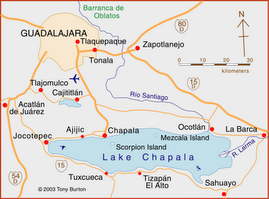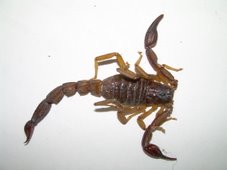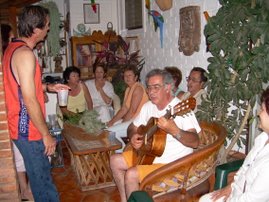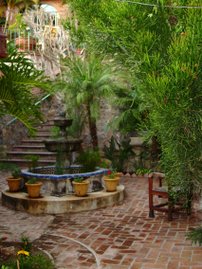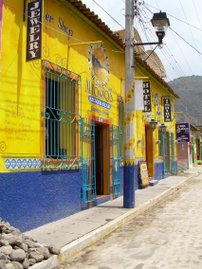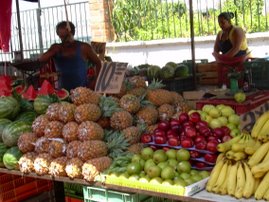 Well, we found our first black widow spider this morning. Actually Maria Elena, our maid, found it when she was dusting around the fireplace. It was bigger than I thought, and very much alive with a web with a baby in it. I was, however, able to overcome my Buddhist instincts and killed them both! We have been spraying the house once a month which has just about eliminated cockroaches and we've seen no more scorpions, but spiders seem to be less affected by the spraying. Anyway, I think this is a cool picture.
Well, we found our first black widow spider this morning. Actually Maria Elena, our maid, found it when she was dusting around the fireplace. It was bigger than I thought, and very much alive with a web with a baby in it. I was, however, able to overcome my Buddhist instincts and killed them both! We have been spraying the house once a month which has just about eliminated cockroaches and we've seen no more scorpions, but spiders seem to be less affected by the spraying. Anyway, I think this is a cool picture.
Last time I wrote about our maid, Maria Elena and our gardener, Horacio. I finally took photos of them. Horacio has been helping us do more in our garden. Plants are very inexpensive with lots of viveros (nurseries) in the area. So it's a good deal: We buy the plants and he does the heavy work!
 Here are two of the garden projects we've been working on. On the left are the "cupo de oros" we have planted next to our terrace to eventually provide shade in the late afternoon. Now the sun streams in. On the right is Pixie's new rose garden.
Here are two of the garden projects we've been working on. On the left are the "cupo de oros" we have planted next to our terrace to eventually provide shade in the late afternoon. Now the sun streams in. On the right is Pixie's new rose garden.


>
Maria Elena comes every Thursday to clean, but she does a little bit of everything. When we were putting on a dinner party with Mexican food one night, she jumped right in to show us how to prepare the chilis. We needed some sheets fitted to our bed, and she altered them for us. She's now started cutting my hair too. I, of course, pay her more for this, but she does a beautiful job, and it beats waiting in line at a Pelequeria (barber shop).
 We have been experiencing a few water/sewer-related problems lately. The water comes from municipal wells here in Riberas, but the water has a lot of sediment and is very hard water. We have been having some problems with the water having a sulfur smell. It's not dangerous; we haven't become sick, but it is an unpleasant smell. It comes and goes, but we can't seem to get rid of it. I've been changing the filters on the water purification system and putting chlorine into the underground water tank (ajibe), but we have switched to bottled water for drinking, although we use the tap water for cooking and washing.
We have been experiencing a few water/sewer-related problems lately. The water comes from municipal wells here in Riberas, but the water has a lot of sediment and is very hard water. We have been having some problems with the water having a sulfur smell. It's not dangerous; we haven't become sick, but it is an unpleasant smell. It comes and goes, but we can't seem to get rid of it. I've been changing the filters on the water purification system and putting chlorine into the underground water tank (ajibe), but we have switched to bottled water for drinking, although we use the tap water for cooking and washing.
The other unpleasant problem is with our septic system. Our leech field is under our back yard. When the septic system, which is on an automatic pump, pumps the effluent into the leech field, we can smell it. It is unpleasant, but it only lasts a short time. But when we moved in, we did not have the problem. After talking to a septic professional, he told me it's because of the soil here. During the rainy season, the ground is saturated, so it takes longer for the effluent to percolate out. Once the rainy season is over next month, the problem should resolve itself. I hope so. Whew. Ultimately, we are supposed to get a sewer system here, so that will solve it.
The other big news for me is that I published a volume of my poetry. My friend Vicente did the cover illustration, and his partner Donna translated my title poem, "Sacred Lake" into Spanish. Here's the cover:
 And here is the title poem:
And here is the title poem:
Sacred
I have come to a place where rivers
Flow from all directions
Into an ancient sacred lake
Which draws those
Searching and yearning, craving
Its cool waters and blood-red sunsets
To calm their souls and please their gods.
I was not looking for a lake
For I had traveled to many lakes
And I did not feel thirsty.
Yet, as I came upon this lake
So resplendent with spirits
Of many lives lived, I found my muse
And it quenched a thirst
I never felt till I fell at its bank
And drank deeply of its richness.
And I sense the presence of stunning
Aztec youth sacrificed to Quetzalcoatl,
Their fluids draining, with their lives,
From the mountains into the limpid waters
Far below. As now I see the old men
Casting their nets, content in their solitude,
Hoping to catch their dreams here.
And now as I drink from this lake
I taste the blood and desperate tears
Of those who cry and bleed for moments lost
Yet their fluids still seep
Into my heart; I embrace my muse
Finding my deep trembling voice
To create every moment anew.
And I bask in the heat of everyone
Who has learned to love again
By this ancient sacred lake.















































